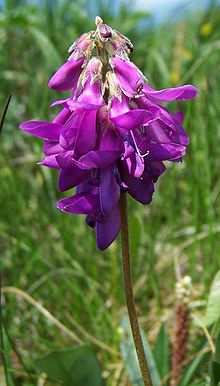Hedysareae is a tribe of plants in the subfamily Faboideae. Hedysareae species have loments, a type of modified legume that breaks apart at constrictions occurring between the segments of the seeds.
| Hedysareae | |
|---|---|

| |
| Hedysarum hedysaroides | |
| Scientific classification | |
| Kingdom: | Plantae |
| Clade: | Tracheophytes |
| Clade: | Angiosperms |
| Clade: | Eudicots |
| Clade: | Rosids |
| Order: | Fabales |
| Family: | Fabaceae |
| Subfamily: | Faboideae |
| Clade: | Meso-Papilionoideae |
| Clade: | Non-protein amino acid-accumulating clade |
| Clade: | Hologalegina |
| Clade: | Inverted repeat-lacking clade |
| Tribe: | Hedysareae DC. |
| Genera | |
|
See text | |
Genera
editThe tribe consists of the following genera:[1][2][3][4]
Caraganean clade
edit- Calophaca Fisch. ex DC.
- Caragana Fabr.
- Halimodendron Fisch. ex DC.
Chesneyean clade
edit- Chesneya Lindl. ex Endl.
- Gueldenstaedtia Fisch.
- Spongiocarpella Yakovlev & N. Ulziykh.
- Tibetia (Ali) H. P. Tsui
Hedysaroid clade
edit- Alhagi Gagnebin
- Corethrodendron Fisch. ex Bashiner[5]
- Ebenus L.
- Eversmannia Bunge
- Greuteria Amirahmadi & Kaz. Osaloo.[2]
- Hedysarum L.
- Onobrychis Mill.
- Sartoria Boiss. & Heldr.[4]
- Sulla Medik.[2]
- Taverniera DC.
Systematics
editMolecular phylogenetics have uncovered the following relationships:[2][3][4]
| |||||||||||||||||||||||||||||||||||||||||||||||||
References
editWikimedia Commons has media related to Hedysareae.
Wikispecies has information related to Hedysareae.
- ^ United States Department of Agriculture (USDA) (2003): Germplasm Resources Information Network – Hedysareae. Version of 2003-JAN-17. Retrieved 2010-AUG-05.
- ^ a b c d Amirahmadi A, Kazempour Osaloo S, Moein F, Kaveh A, Asghar Maassoumi A (2013). "Molecular systematics of the tribe Hedysareae (Fabaceae) based on nrDNA ITS and plastid trnL–F and matK sequences". Plant Systematics and Evolution. 300 (4): 729–747. doi:10.1007/s00606-013-0916-5. S2CID 15918728.
- ^ a b Duan L, Wen J, Yang X, Liu P-L, Arslan E, Ertuğrul K, Chang Z-Y (2015). "Phylogeny of Hedysarum and tribe Hedysareae (Leguminosae: Papilionoideae) inferred from sequence data of ITS, matK, trnL–F and psbA–trnH". Taxon. 64 (1): 49–64. doi:10.12705/641.26.
- ^ a b c Liu P-L, Wen J, Duan L, Arslan E, Ertuğrul K, Chang Z-Y (2017). "Hedysarum L. (Fabaceae: Hedysareae) is not monophyletic—Evidence from phylogenetic analyses based on five nuclear and five plastid sequences". PLoS One. 12 (1): e0170596. doi:10.1371/journal.pone.0170596. PMC 5266277. PMID 28122062.
- ^ Choi BH, Ohashi H (2003). "Generic criteria and an infrageneric system for Hedysarum and related genera (Papilionoideae-Leguminosae)". Taxon. 52 (3): 567–576. doi:10.2307/3647455. JSTOR 3647455.